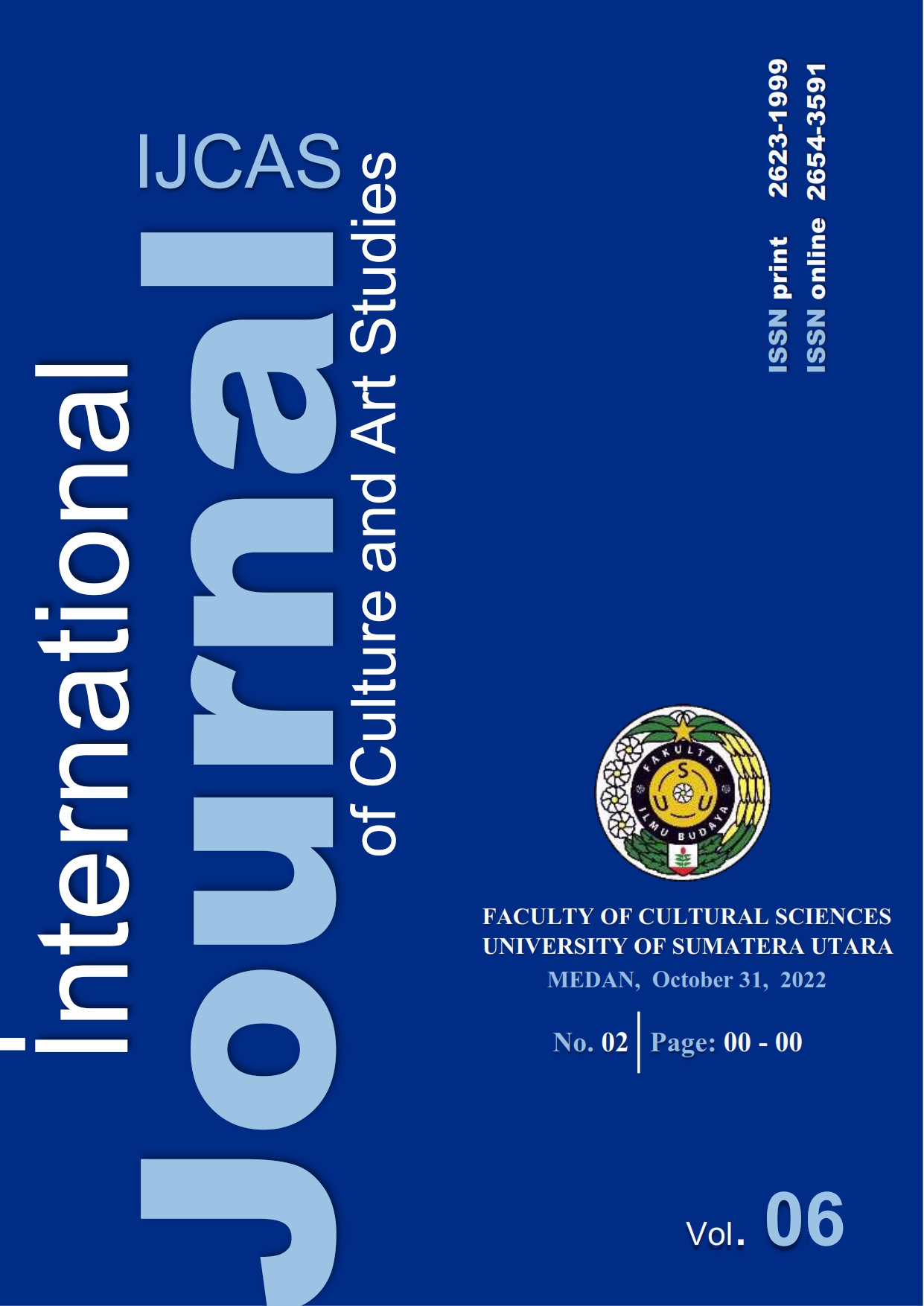The History of Hakka Diaspora in Indonesia: Migration Waves and Negotiations with National Identity
DOI:
https://doi.org/10.32734/ijcas.v6i2.8928Keywords:
Hakka Diaspora, Indonesian History, Migration Waves, National IdentityAbstract
The Hakka Diaspora is one of the immigrant descendants who have lived in Indonesia for a very long time. Their existence has often experienced ups and downs. This study aims to analyze the waves of Hakka migration to Indonesia and how they negotiate with national identity. This study used a descriptive qualitative approach to analyze this phenomenon with data collected from interviews and literature studies. The research results showed that the wave of Hakka migration to Indonesia does not only come from mainland China but also from Taiwan. The Hakka migration waves from mainland China largely occurred during the Qing dynasty due to overcrowded populations, the difficulty of land ownership, and government discrimination problems. Meanwhile, the Hakka migration from Taiwan occurred after the Treaty of Shimonoseki in 1895, which forced the Qing dynasty to surrender Formosa to Japan after the First Sino-Japanese war and mass company relocation in the 1980s due to rising production costs in Taiwan. Second, to negotiate their background with Indonesian identity, the Hakka have five philosophies of life called Hakkacita. This philosophy emphasizes conscience, good virtue, cohesiveness, devotion, and shared prosperity between Hakka descendants and other ethnic groups within the framework of Indonesian nationalism.
Downloads
References
Brinkmann, S. & Kvale, S. (2018). Doing interviews. Second edition. London: SAGE Publications. https://dx.doi.org/10.4135/9781529716665.
Cao, Y. H. 曹云åŽ. (2013). å°å°¼å®¢å®¶äººçš„社团å˜è¿ [The changes of the Indonesian Hakka community]. Hong Kong: Rì Yuè XÄ«ng ChÅ« BÇŽn Shè.
Dong, B. M. & Guo, Y. B. (2018). The impact of the first Sino-Japanese war indemnity: Transfer problem reexamined. International Review of Economics and Finance, 56: 15-26. https://doi.org/10.1016/j.iref.2018.03.013.
Evers, H. D. (2016). Nusantara: History of a concept. Journal of the Malaysian Branch of the Royal Asiatic Society, 89(1): 3-14. https://doi.org/10.1353/ras.2016.0004.
Gelfand, M. J. & Brett, J. M. (2004). The handbook of negotiation and culture. Stanford: Stanford University Press.
Goebel, Z. (2013). The idea of ethnicity in Indonesia. Tilburg Papers in Culture Studies, 71: 1-34. https://doi.org/10.13140/RG.2.1.1812.8728.
Heggheim, R. (2011). Three cases in China on Hakka identity and self-perception. Master thesis. Oslo: University of Oslo.
Hertzman, E. (2019). What does it mean to be ‘called home’ from overseas? The case of Hakka Chinese Indonesian youth from West Kalimantan. Journal of Ethnic and Migration Studies, 46: 3526-3542. https://doi.org/10.1080/1369183X.2019.1592415.
Hertzman, E. (2014). Returning to the kampung halaman: Limitations of cosmopolitan transnational aspirations among Hakka Chinese Indonesians overseas. ASEAS – Austrian Journal of Southeast Asian Studies, 7(4): 147-164. https://doi.org/10.14764/10.ASEAS-2014.2-2.
Hoon, C. Y. (2008). Chinese identity in post-Suharto Indonesia: Culture, politics and media. Sussex: Sussex Academic Press.
Horstmann, K. (1980). The Nanyang Chinese - History and present position of the Chinese in Southeast Asia. GeoJournal, 4(1): 64-66. https://www.jstor.org/stable/41142910.
Hsu, Y. T. (1976). Notes relating to admiral Cheng Ho's expeditions. Journal of the Malaysian Branch of the Royal Asiatic Society, 49(1): 134-140. https://www.jstor.org/stable/41492126.
Hung, C. C. (1981). Taiwan under the Cheng family, 1662-1863: Sinicization after Dutch rule. Doctoral dissertation. Washington: The Georgetown University.
Indahwati, S. & Christiana, E. (2017). Semangat Hakka yang dicerminkan oleh orang Hakka melalui kegiatan merayakan imlek [Hakka spirit reflected by Hakka people through activities celebrating lunar new year]. Century: Journal of Chinese Language, Literature and Culture, 5(1): 1-9. https://doi.org/10.9744/century.5.1.1-9.
Liao, K. S. 廖开顺. (2013). 对å°å°¼å®¢å®¶æ–‡åŒ–生æ€é—®é¢˜çš„æ€è€ƒ [Reflections on Hakka culture and ecology in Indonesia]. Hong Kong: Rì Yuè XÄ«ng ChÅ« BÇŽn Shè.
Lim, H. & Mead, D. (2011). Chinese in Indonesia: A background study. Washington: SIL International.
Lin, P. æž—å¹³. (2016). æµ·å¤–å„ªå‹¢ç§»æ°‘ï¼šé›…åŠ é”çš„å°ç£äºº [Being privileged overseas: Taiwanese people in Jakarta]. Trans-local Chinese: East Asian Perspectives, 10(2): 207-231. https://doi.org/10.1163/24522015-01002003.
Lin, P. Y. (2017). Introduction: Relocating the multilingual new Taiwanese literature. East Asian Comparative Literature and Culture, 8: 1-44. https://doi.org/10.1163/9789004344501_002.
Lockard, C. A. (2013). Chinese migration and settlement in Southeast Asia before 1850: Making fields from the sea. History Compass, 11(9): 765-781. https://doi.org/10.1111/hic3.12079.
Miles, M. B., Huberman, A. M., & Saldana, J. (2019). Qualitative data analysis: A method sourcebook. Fourth edition. London: SAGE Publications.
Mokodongan, A. I. (2014). Hakka identity representation into Indonesian Hakka Museum Taman Mini Indonesia Indah. Master thesis. Jakarta: Universitas Indonesia.
Nakagawa, M. (1975). Studies on the history of the Hakkas: Reconsidered. The Developing Economies, 13(2): 208-223. https://doi.org/10.1111/j.1746-1049.1975.tb00352.x.
Downloads
Published
How to Cite
Issue
Section
License
Copyright (c) 2022 Bayu Mitra A. Kusuma, Theresia Octastefani

This work is licensed under a Creative Commons Attribution-ShareAlike 4.0 International License.













